- Home
- Michael Dobbs
The Reluctant Hero Page 5
The Reluctant Hero Read online
Page 5
‘Oh, fat chance.’
In the background Harry heard a youthful cry and a Gallic curse before McKenzie came back on the line.
‘Sorry, Harry, all yours now.’
‘Stay, Mac. Call in sick. Would you do that? Just tell Roddy you can’t go. I’d like to take your place.’
‘You can’t be serious, old mucker.’
‘Never more so.’
‘But it’s the middle of bloody winter there. And Roddy’s such a prick.’
‘What are you saying?’
‘He practically broke my arm to get me to agree in the first place. You know what he’s like. I’ve been kicking myself ever since – must have been pished. No, come to think of it, must have been completely bloody paralytic. I’ve spent the whole of Christmas trying to figure out some way of wriggling out of it.’
‘Why not simply say no?’
‘You know what a hideous bully he can be. And –’ he sighed – ‘I owe him a couple of favours. He never stops reminding me. Payback time.’
‘So you’ll help?’
‘Harry, if I was a true friend, I’d save you from yourself. But if you’re wanting to spend a few days cuddled up to Roddy Bowles in the frozen armpit of Central Asia, it’s all yours. Call in sick? What sort of malady do you want me to contract? Something lurid, I hope.’
‘Anything that stops you rushing back. But let me be the one to tell him first.’
‘Whatever. Look, I’ve reached the head of the bloody line, got to dash. Totally raving mad, you are, Harry. God, I hope you’ll not be living to regret this. Tally ho . . .!’
The connection went dead.
It was the following afternoon before Harry called on Roddy Bowles once more.
‘Why, Harry. This is becoming a habit.’ Bowles opened the door with such reluctance its hinges might have seized.
‘I was passing,’ Harry lied. ‘Thought it better than the phone.’ That was truthful, at least, beard the bully in his own den, face him down. And gather intelligence. The woman’s coat was still slung over the chair.
Harry glanced round the room. ‘So how’s the curating going, Roddy?’
‘You mentioned some coincidence,’ Bowles said, making a point of ignoring the question.
‘Yes, poor Mac. He’s the one who first mentioned your Ta’argistan trip to me. Got me interested.’
‘And?’
‘Well, tripped over his bloody skis, the idiot, hasn’t he? Got himself a case of mild concussion. Can’t fly, and so can’t be on parade.’
Bowles took a deep breath and with ill-concealed impatience brushed away imaginary fluff from the front of his double breast. He could see where this one was going.
‘He called me from the hospital. Worried about disappointing you,’ Harry continued.
‘I’m not sure the man’s capable of disappointing me,’ Bowles replied tartly.
‘That’s why he asked me to take his place on the trip.’
The eyes flared icily. ‘Impossible.’
‘I know it’s a coincidence, but it solves all your problems.’
‘That’s where I’m afraid you’re wrong, Harry. You know I have to offer any spare place to others. There’s a waiting list, you know.’
‘What? You leave the day after tomorrow.’
‘Which is yet another reason why it won’t work. Visas. You’d never get one in time.’
‘But I’ve already applied online. It’ll be waiting for me at the airport.’
Suddenly Bowles snapped, tugging furiously at the sleeves of his blazer as though to keep them from reaching out for Harry’s neck. ‘I will not be bounced like this!’
‘Bounced, Roddy? But I thought I was helping. After all, you said you’d love to have me on board.’
‘I’ll not allow you to go behind my back.’
‘Roddy, how can you say that? I’ve done no such thing. As soon as I heard from Mac I called you at home.’
‘What?’ Bowles snapped, his voice rising in alarm.
‘Yesterday evening. Spoke to your wife. Asked her to give you a message.’
And suddenly Bowles was in retreat. ‘Ah, I see,’ he sighed in the manner of a deflating balloon, and colouring as though his collar had suddenly tightened several sizes. He glanced away, unable to meet Harry’s eye. His attention became fixed upon the woman’s coat. He knew Harry had seen it, too. ‘My wife and I, we, er . . . haven’t been in contact the last couple of days.’
Harry allowed a moment of suffocating silence to settle on his quarry, but he couldn’t let it last. He had to allow the man a means of retreat. He might yet need the bastard.
‘I’m sorry if I’ve put you out, Roddy. That wasn’t my intention, I assure you. But you said the Ta’argis were expecting five and – well, five it will still be. I thought I was doing the right thing.’
‘Yes. Of course.’
Harry waited for Bowles to say more, but although the man’s lips were working furiously, no sound came forth. ‘I’ll see you at the airport, then, Roddy. Have a good evening.’
As he left, the door seemed to close so much more easily behind him.
Zac pushed his fingers into his ears to blunt the incessant sound of screaming.
The noise continued for a long time before he realized the screams were his own.
CHAPTER THREE
They hadn’t yet arrived, but already the character of the group was beginning to take shape. Bowles stood at the helm, still fully buttoned, the officious and, it had to be said, efficient captain. He’d done this trip before, knew the form, and wanted everyone to know it. Sid Proffit, dear fellow, was a member of the House of Lords, in his late seventies and happy to claim the status of 2I/C on account of his seniority and enthusiastic naval whiskers. He still retained a roguish twinkle, which became evident as he summoned the cabin attendant to refill his glass. Bobby Malik was the serious type, quiet, diligently wading through the briefing papers he had brought with him, the youngest in the group, a new arrival to Westminster after a much-heralded victory at a by-election. He seemed uncertain why he had come or what he was doing here. Harry barely knew him but concluded that, like Mac, he had been a victim of the Bowles press gang.
And then there was Martha Riley. Martha was late thirties, petite, provocative and, in Harry’s view, overflowing with attitude. Their brief encounters around Westminster had always left him with a headache; she seemed somehow to resent him and his success, as though it was undeserved. She was American-born, a New England liberal with a New York edge, which made her exceptional if not quite unique in the history of the House of Commons. The first woman ever to sit in the chamber had been the American-born Nancy Astor, a woman with an attitude built on her husband’s uncompromising wealth and with a tongue as generous as a pocketful of razor blades. The British electorate had waited ninety years before they’d dare repeat the experiment; in Harry’s view, they’d jumped the gun.
She was a difficult woman to pin down and almost impossible to categorize. Martha was witty, frequently saucy, and occasionally in private she had a mouth like a garbage can, yet she confused many men by also being surprisingly puritanical. Several of her colleagues at Westminster had attempted to drag her off to a secluded corner, but so far as was known she had resisted all such encounters, sending the befuddled lecher away with the sound of buckshot in his ears. Her views on the male of the species were unequivocal. She had, she said, married well, to a man who was exceptionally wealthy and took frequent liberties. In her turn, seven years later, she had taken his house and a great chunk of his fortune, and never looked back. ‘I was born screaming, and I haven’t stopped since,’ she would declare. Now she was complaining about the meal.
Harry sighed and closed his eyes, trying to catch a little sleep. It was a flight that would last almost ten hours and he’d need all his wits around him when they arrived. He had no clear plan, only doubts. He’d spent the past two days immersing himself in everything Ta’argi, and it had proved to be a pretty co
ld bath. He had taken what he could from the Foreign and Commonwealth Office, followed that up with Amnesty International and Human Rights Watch, and tried to fill the gaps with Google.
He had also pursued the US Embassy, not for what they knew about Ta’argistan but for what they might tell him about Zac. There he’d run headlong into a wall of silence, or it might have been simple ignorance, so he had appealed to his friend the ambassador, who had promised to get someone to call back. A military attaché eventually did.
‘Captain Zachariah P. Kravitz.’ Harry hadn’t known he was a P. That, at least, was something new. Nothing else was. ‘Yes, sir,’ the attaché continued, ‘he once served in the US armed forces, but that was some time ago. Hasn’t lived in the United States itself for almost ten years. He is no longer reporting on any of our radars, sir.’
‘And what does that mean?’ Harry had asked.
There was a short, baffled silence. ‘It means precisely what it says, sir.’
‘Not on our radar? What’s he supposed to be, some kind of jumbo jet?’
‘That’s all I’ve been given, sir,’ the young attaché replied awkwardly. He was clearly reading from a statement; these opaque words came from somewhere higher up the food chain. He coughed, as though something were sticking in his throat, then began reciting once more. ‘But I can tell you that we regard Ta’argistan to be an aspirational democracy, and consequently a government which the United States considers friendly.’
Friendly? Not if half of what he’d been told by an elderly Russian from Human Rights Watch was true. Harry recognized the American’s impenetrable jargon for what it waS. A warning. Deep water. Keep out.
Roddy got them upgraded to business class. Had to give that much to him, the man had clout. They took off shortly before midnight, leaving the clamouring lights of London behind them for a flight that lasted many hours, flying against the sun. Roddy’s upgrade proved a blessing, for it enabled them to catch a little sleep, although as they woke they found the world outside already fading as they headed for the dark side of the planet. Beneath them unfolded endless miles of emptiness, snow like suffocating gauze on landscape lit by a cold steel moon. It seemed devoid of any trace of life. No roads, no traffic, no villages, not even an occasional campfire. Harry glanced across the cabin at Martha. She was no longer complaining or even talking, but had her eyes closed and was concentrating on her breathing as she gripped the arms of her seat. Strange woman, Harry thought, full of contradictions. Attractive in her own way – in fact, more than that when she allowed herself a smile, but years of working out as a professional ball-breaker had tugged away at the corners of her mouth. She was ambitious, never hid it, and the accepted wisdom in the corridors of Westminster was that she was destined to get her overdue leg-up to ministerial rank as soon as the Prime Minister decided the time had come to wring a few more necks in the dovecote. Perhaps then she would learn to smile. Martha had been in Parliament six years, her career still ahead of her, whereas Harry . . . Harry was a maverick, did things his own way, was temperamentally unsuited to dancing to another man’s tune, a grievous sin in Westminster. There were some who thought his time was past, and perhaps they were right, while it seemed likely that Martha would soon be pulling a ministerial salary and disappearing from view in a chauffeur-driven car, off to some official engagement which she would use as an excuse to lecture the rest of the world. Harry resolved to buy himself a pair of stout earplugs.
But that was tomorrow’s business. Right now, the flaps of the 757 were dropping beneath the wings as the plane began its final descent. Ahead, Harry could see the first flickers of civilization. The glowing lines of a runway pointed towards a distant medley of lights that was the airport terminal, but suddenly, and seemingly at the last moment, they disappeared. In the blink of an eye there was no terminal, no runway, nothing but renewed darkness. The engines roared ferociously in protest.
The aircraft was lifting and turning when a voice came on the intercom, a woman, the First Officer. ‘I’m sorry, ladies and gentlemen, nothing to worry about, but they appear to be having a bit of trouble at Ashkek. A power outage, by the looks of it. Hey ho, not great timing. It happens in this part of the world. They’re supposed to have an emergency back-up system, but I suspect their gennie’s frozen, so we’re just going to cruise round and hold for a bit to let them sort themselves out. Meanwhile, sit back and relax. We’ll be on the ground in no time.’
She was as good as her word. It may have seemed a lifetime for the faint of heart, but it was no more than a few minutes before the wheels touched down with barely the hint of a thump upon a snow-skimmed runway and the aircraft whined slowly to a halt. Not until then did Martha open her eyes. Hazel, with a hint of marmalade, to go with bobbed hair the colour of chestnuts. Did it come out of a bottle, like the Prime Minister’s? Harry wondered.
He was soon distracted from drawing any further conclusions about Martha by his first sight of Ashkek. The single terminal was drab and illlit, even with the power restored.
‘What are we doing here?’ the youthful Malik muttered, his brow creased in disappointment as he shivered in a blast of chill wind.
It was a question Harry hadn’t entirely resolved for himself. ‘Your first parliamentary trip?’
Malik nodded.
‘There are alternatives. You might prefer to discover a passionate interest in the film industry, or maybe space travel.’
‘What do you mean?’
‘Hollywood and Florida. And you’d be surprised how many of our parliamentary colleagues have developed a previously unknown but unrelenting desire to study the impact of rising sea levels on places like the Maldives. That’s what this game is about. Just be careful not to get trampled in the rush.’
‘I’m not like that,’ Malik protested, a little piously, ‘I don’t see my job as a matter of privilege.’
‘Then welcome to Ta’argistan.’
There was a welcome, of sorts. While most of the passengers joined the shuffling queue to have their passports checked, Bowles and his group were taken to a VIP lounge, a solemn affair with severe furniture and dusty artificial flowers, and two armed guards on duty outside the door. There the group was greeted by an official with agitated eyes and stiff English who introduced himself as Sydykov. He collected their passports, offering them tea while he dealt with the formalities and their luggage. That got Martha going.
‘I’ve got three bags,’ she declared, slowly, her voice rising as though speaking to a village bumpkin. ‘Three,’ she repeated, holding up the appropriate number of fingers. ‘One is small, so please make sure it isn’t overlooked.’
Harry winced at the performance. He could tell a military man even in his civvies. Sydykov seemed to reciprocate, coming across to introduce himself to Harry more formally.
‘Your rank?’ Harry enquired, shaking his hand, noticing its firm grip.
‘I hold the rank of major,’ Sydykov replied.
‘In which service?’
But the man simply smiled and moved on, as though he hadn’t understood.
Sydykov was there once again as they gathered in the foyer of their hotel two hours later, his smile still stretched in that fixed, dutiful manner, as stiff as the covers of the passports he handed back. The visitors had been given time to unpack and rest and were now waiting to be driven to the Presidential Palace for dinner, their first formal engagement of the tour. Martha Riley was still behaving like grit in a shoe. She looped her arm through the major’s, as though they were now old friends.
‘Now, I don’t wish to complain,’ she began, ‘but I couldn’t find any sign of a hairdryer in my room.’
With her free hand she ruffled her hair and returned his smile, while he appeared temporarily speechless, almost stunned.
‘And may I ask what that elderly lady is doing, sitting outside our rooms at the end of the corridor?’
Sydykov stiffened. ‘She, Mrs Riley, is there to ensure your comfort,’ he replied, his lips now t
aut in exasperation.
‘I asked her about the hairdryer, of course I did, but she didn’t seem to understand. How can she help us if she doesn’t speak English?’
Once again Sydykov seemed anxious to move on. ‘Forgive me, Mrs Riley, while I make arrangements for your hairdryer.’
‘That’s so kind of you,’ she said to his retreating back. ‘A girl’s got to look nice for the President.’
Harry found himself torn between rising irritation and the gentle tickle of amusement. How could she be so crass? Hadn’t she realized who the hell Sydykov was? Yet the sight of a major in the internal security service being used as a dog to fetch a stick held its own small pleasures. This was touted as a goodwill visit, yet they weren’t even trusted to wander around the hotel on their own. He’d already spotted the additional plain-clothes security, two of them sitting stiffly in the foyer. The hotel was constructed in the monumental, almost brutal style of the Soviet era and its public parts had all the sense of fun of a funeral parlour. The foyer could comfortably hold two hundred, yet there weren’t twenty. There was no crowd to get lost in, everyone stood out, particularly two goons.
Harry’s mind went back to the researcher from Human Rights Watch whom he’d met in a coffee house in Bloomsbury, near the British Museum. He was an old, wizened Russian named Pyotr whose crooked back and pronounced limp told of a life of troubles behind what had once been the Iron Curtain. He had a cracked voice and a thick Slavic accent, and as he spoke tears formed in his eyes. Harry couldn’t decide whether they were caused simply by his age, or by the sad tales he had to tell of a land filled by perpetual snows and suspicion. Now Harry was here, and the old Russian’s stories seemed to be coming to life.
Sydykov had returned, bringing with him a hairdryer, a preposterously large contraption that Martha immediately claimed and held aloft as though she had just won an Oscar.
‘Thank you so much, Mr Sickof.’ She made a point of mispronouncing the name. ‘Back with you in five minutes, gentlemen,’ she declared, disappearing in the direction of her room.

 Last Man to Die
Last Man to Die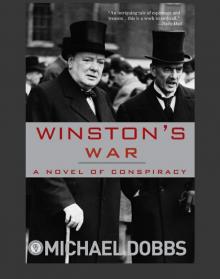 Winston's War
Winston's War The House of Cards Complete Trilogy
The House of Cards Complete Trilogy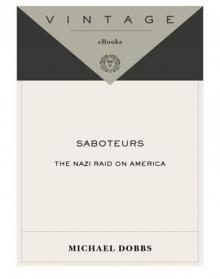 Saboteurs
Saboteurs The Touch of Innocents
The Touch of Innocents WC02 - Never Surrender
WC02 - Never Surrender Old Enemies
Old Enemies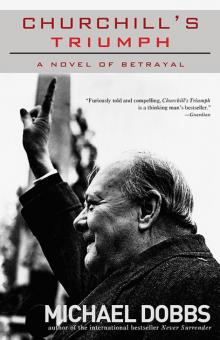 Churchill's Triumph
Churchill's Triumph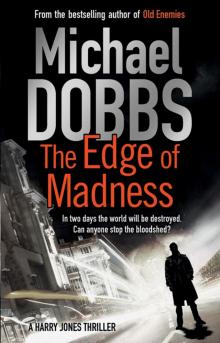 The Edge of Madness
The Edge of Madness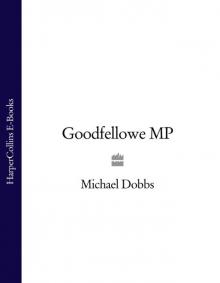 Goodfellowe MP
Goodfellowe MP The Final Cut
The Final Cut Whispers of Betrayal
Whispers of Betrayal Churchill's Hour
Churchill's Hour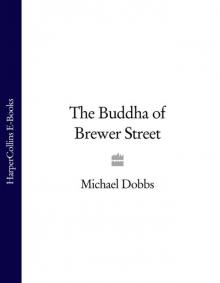 The Buddha of Brewer Street
The Buddha of Brewer Street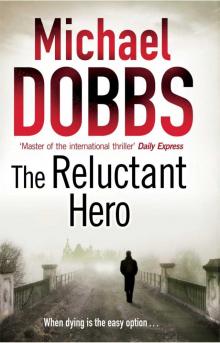 The Reluctant Hero
The Reluctant Hero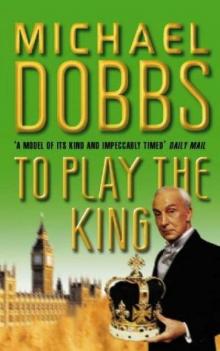 To Play the King
To Play the King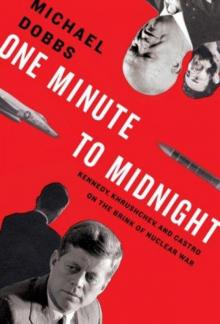 One minute to midnight
One minute to midnight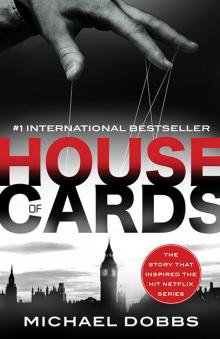 House of Cards
House of Cards The Lords' Day (retail)
The Lords' Day (retail)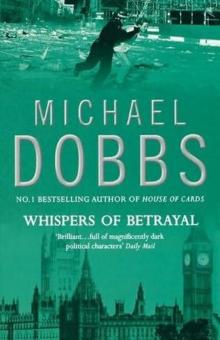 Whispers of betrayal tg-3
Whispers of betrayal tg-3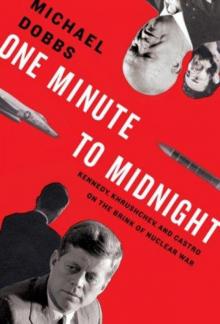 One minute to midnight: Kennedy, Khrushchev, and Castro on the brink of nuclear war
One minute to midnight: Kennedy, Khrushchev, and Castro on the brink of nuclear war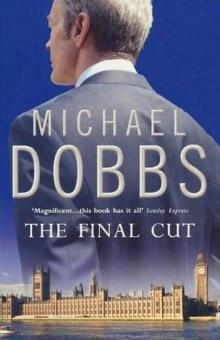 The Final Cut fu-3
The Final Cut fu-3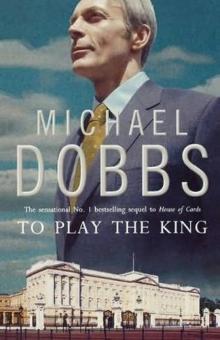 To play the king fu-2
To play the king fu-2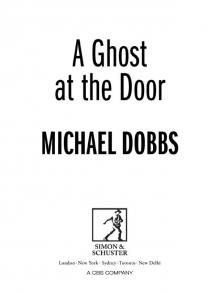 A Ghost at the Door
A Ghost at the Door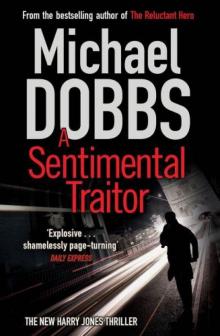 A Sentimental Traitor
A Sentimental Traitor